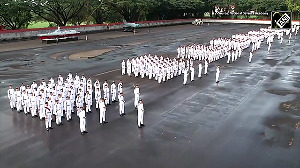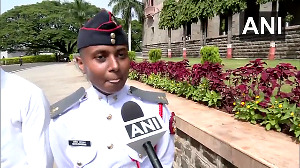‘Whether it is a good upgrade or not is something the judges will decide on the technicalities of the process, not substance.
‘But they can’t do much because of the constitutional fiction they themselves propounded with their “basic structure” formulation.
‘That has not been violated because Article 370 was constitutionally temporary,’ says T C A Srinivasa Raghavan.

August is not the month for wondering about the Indian Constitution. That annual activity is reserved for January, the month when it was adopted, in 1950.
But now that Messrs Modi and Shah have used it as a weapon against the former state of Jammu and Kashmir, one can be forgiven for the indulgence. These are, after all, momentous times.
So the idle thought is this: If religions and constitutions are both the product of the human brains devised in order to bring order to peoples’ lives and societies, why do some people prefer one over the other?
As demand theory would say, they should be on an indifference curve.
Not just that: If religions can be criticised for being the product of their times and not valid for eternity, why can’t constitutions?
If what was written in 1949 valid for all times, contexts and circumstances, why can’t the same be said for all religious texts?
Why laugh at people who quote from the scriptures and not from constitutions?
One answer to this question is that while religions were not “adopted” by “the people”, constitutions have been so adopted. Thus, fervour for this or that religion notwithstanding, constitutions are to be preferred.
But wait: Is not ascribing inter-temporally valid wisdom to the idea of “Founding Fathers” thrusting upon them a sort of divinity?
Another answer people give is that reform is crucial and both are open to it -- even Islam in spite of its 700-year-old ban on ijtihad or questioning.
However, both religious and constitutional fundamentalists get very angry when a reform is actually attempted or adopted.
Sensible India
In a word, then, the problem is not the wisdom of religions and constitutions. It is the fundamentalism of the religious and the constitutional nutcases.
Sensible societies indulge this anger of the status quoists and get on with the reforms, whether it is to religious or constitutional practice. India has been a champion at this.
The British, who claim the parentage of the very idea of constitutions, have been typically slimy: They have never written anything down.
In Britain no one much talks about the constitution, only about constitutional practice -- which is as malleable as plasticine.
The US constitution has been amended 33 times in 227 years. The Australian one has been amended eight times in 116 years -- and it takes a referendum to get it done.
The Irish constitution, from which ours has borrowed quite a lot, has been amended 35 times in about 75 years.
The French have made about 30 amendments in 56 years but mostly about their former colonies and elections, etc.
Our Constitution, meanwhile, has been reformed 104 times in just 70 years.
I used to think this was because the original was faulty. But now I believe that we have been very sensible about it.
In modern parlance, we have not shied away from system upgrades.
That’s why the amendments to Article 370 are no more than a systems upgrade. Whether it is a good upgrade or not is something the judges will decide on the technicalities of the process, not substance.
Delicious irony
But they can’t do much because of the constitutional fiction they themselves propounded with their “basic structure” formulation.
That has not been violated because -- this is delicious -- Article 370 was constitutionally temporary.
The wise men who framed the Constitution made it temporary because they understood that it contained the seeds of secession. But they put it there because they had to indulge Nehru.
Here Sardar Patel erred. He should have stood firm.
By 1953, even Nehru had realised that Article 370 was a huge mistake. He therefore locked up and exiled “Prime Minister” -- would you believe it -- Sheikh Abdullah, his blue-eyed boy, from Kashmir for 15 years.
But Nehru died in 1964. Sheikh Abdullah was released only in 1968 because by then Indira Gandhi, who hugely diluted Article 370 in 1975, was surrounded by Kashmiri (Pandit) advisers.
The wonder, as Prime Minister Narendra Modi pointed out during his Independence Day speech, is that this troublesome provision was allowed to germinate and bloom to such an extent that a mere four million Muslims of a small valley -- 80 miles by 40 miles -- were able to hold not just the remaining 1,300 million Indians but also the superpowers to ransom by cunningly feeding the appetite of the Pakistan military.
As Churchill might have said, never have so many been bullied so much by so few.
And as Sam Pitroda ought to say, “gaya toh gaya”.












